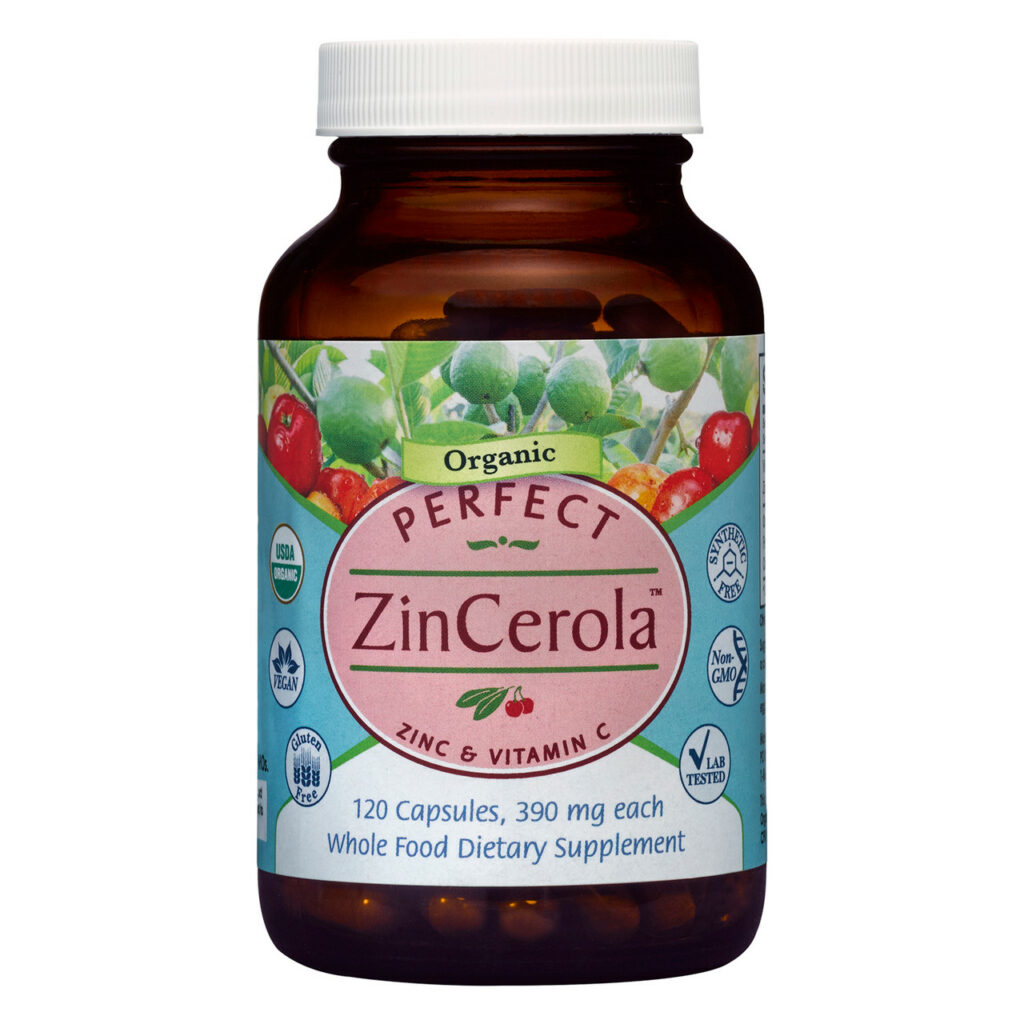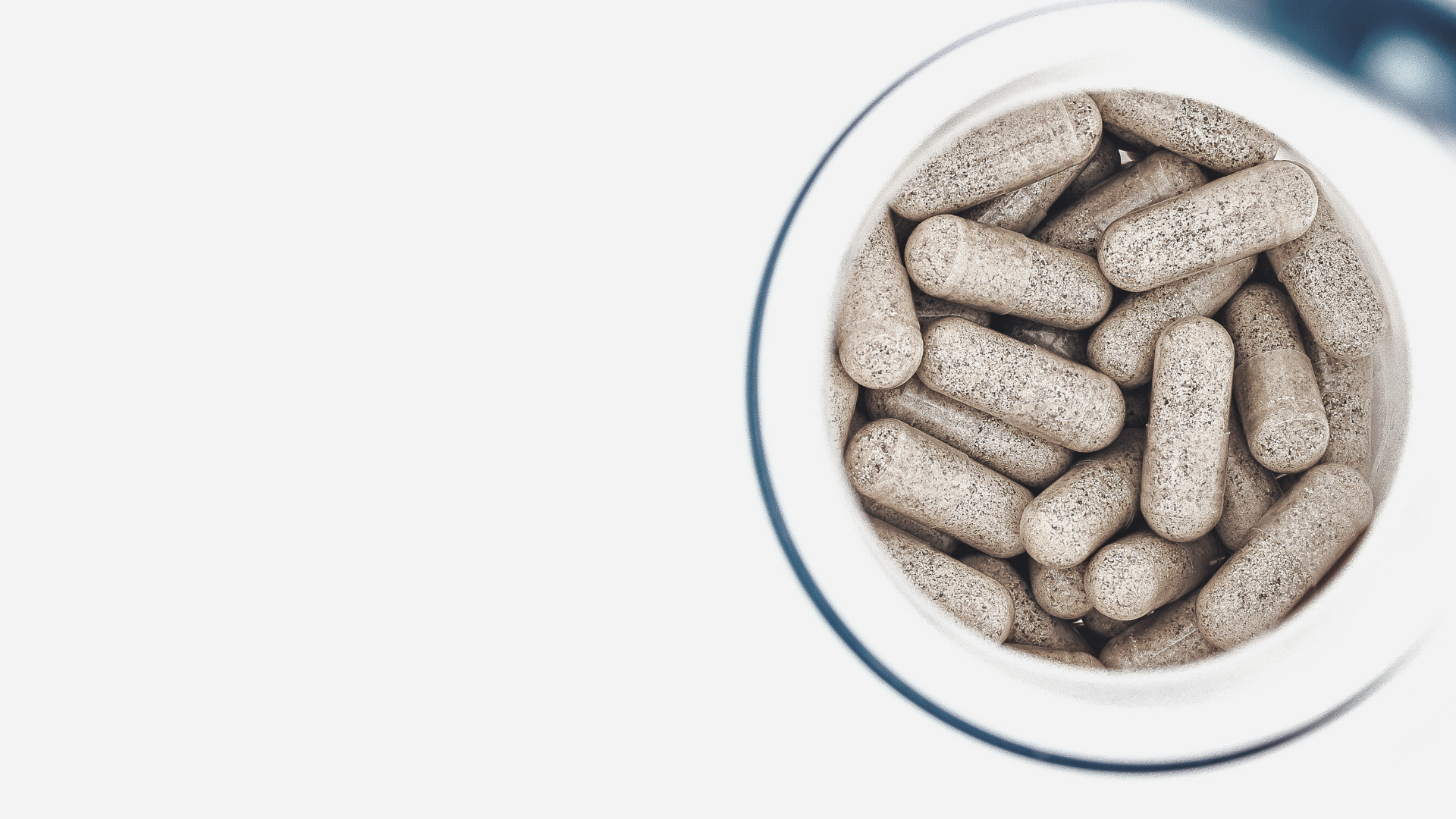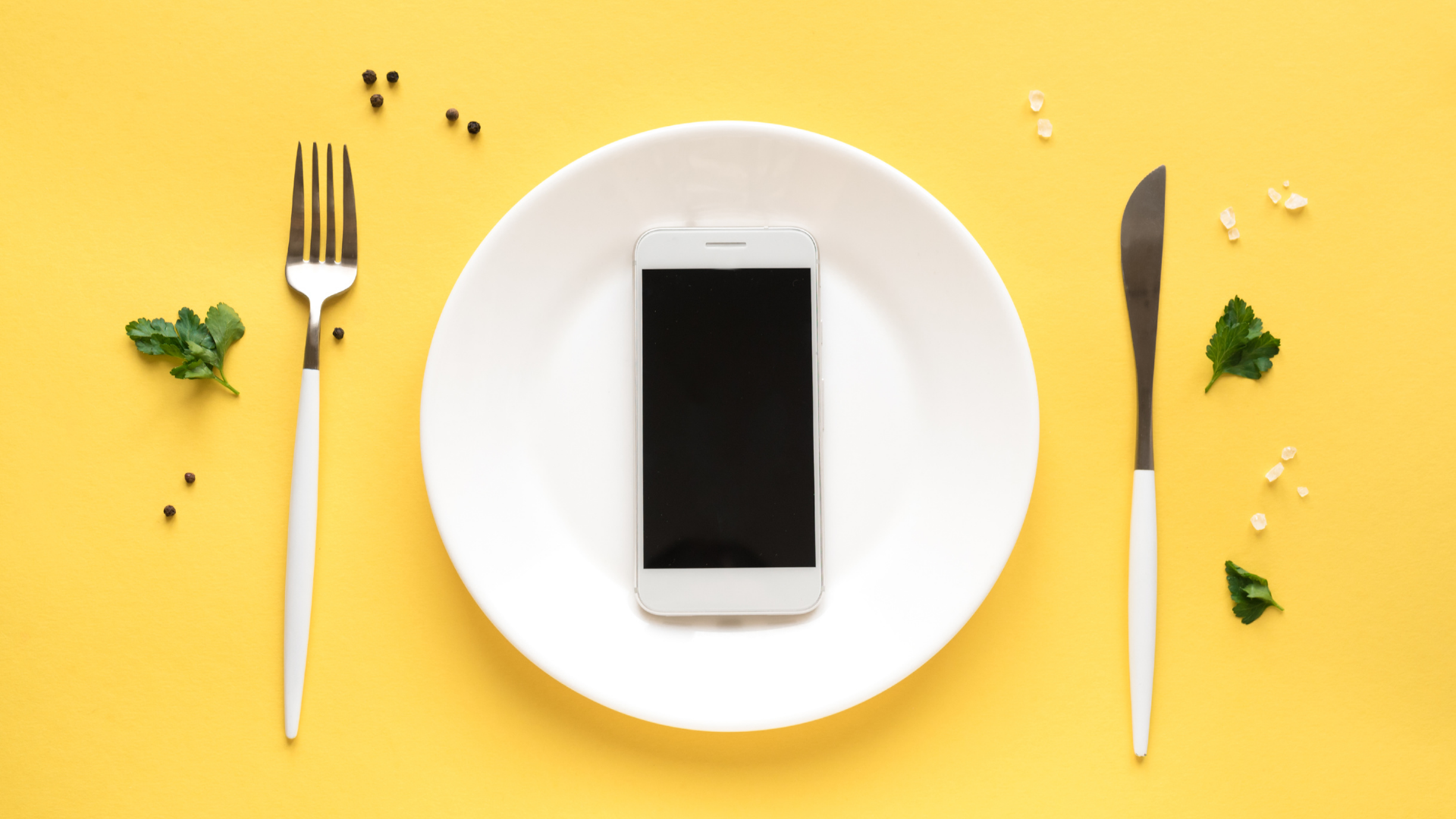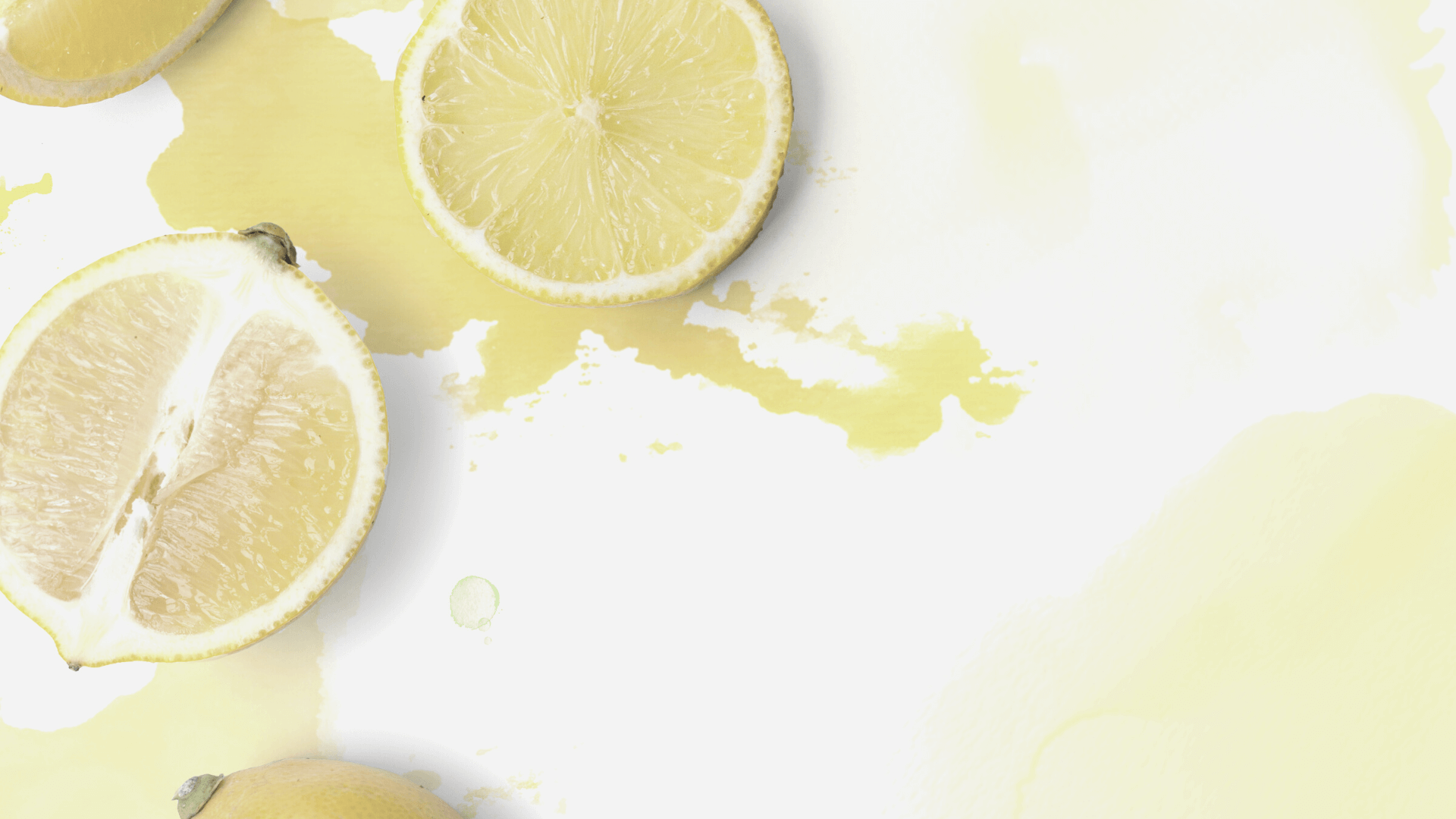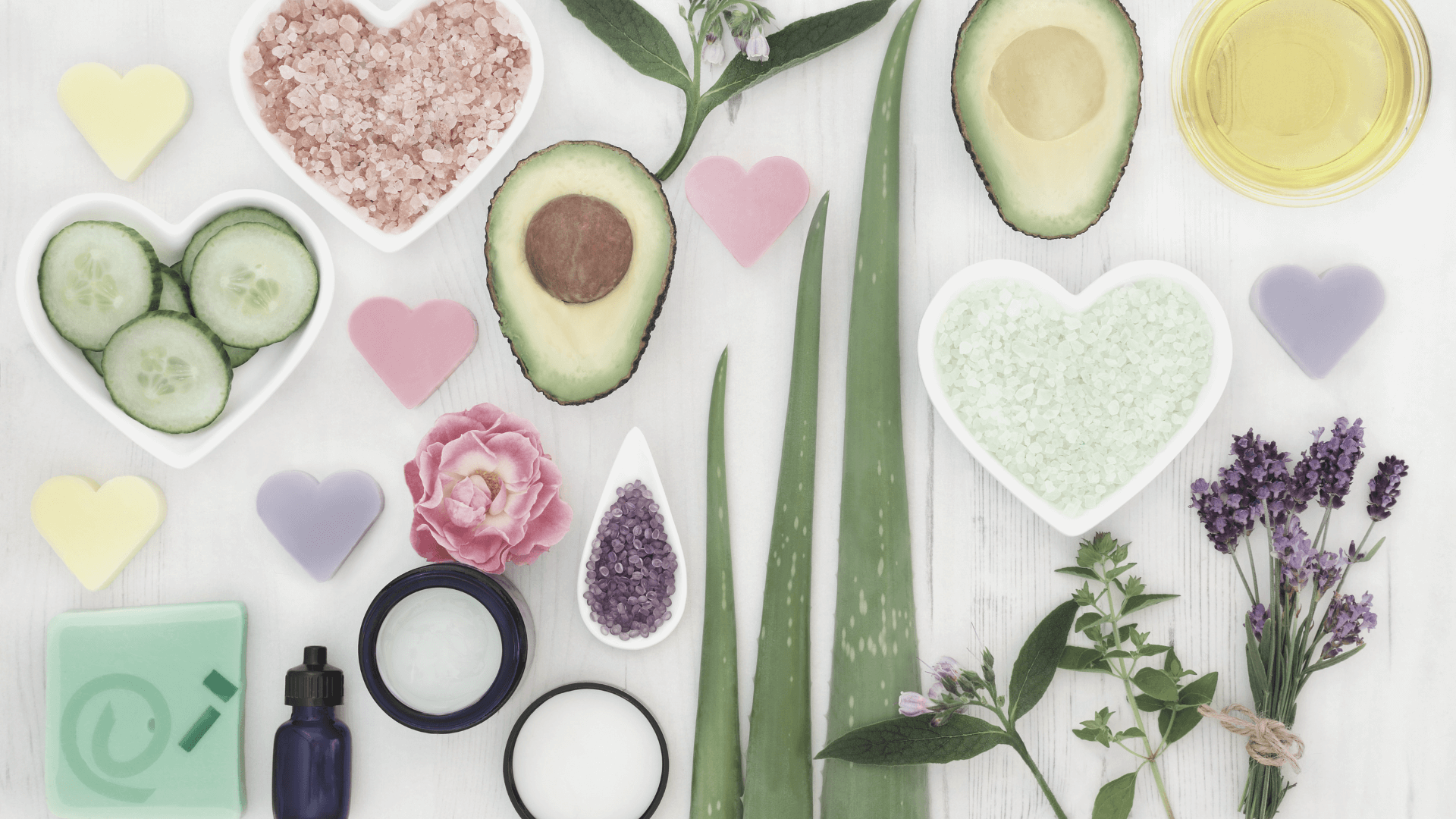Zinc is a supplement mentioned in The Leaky Gut Meal Plan, but not in great detail. So today I want to share the importance of zinc and gut health.
Zinc and Gut Health
Click HERE to save this post on zinc and gut health for later.
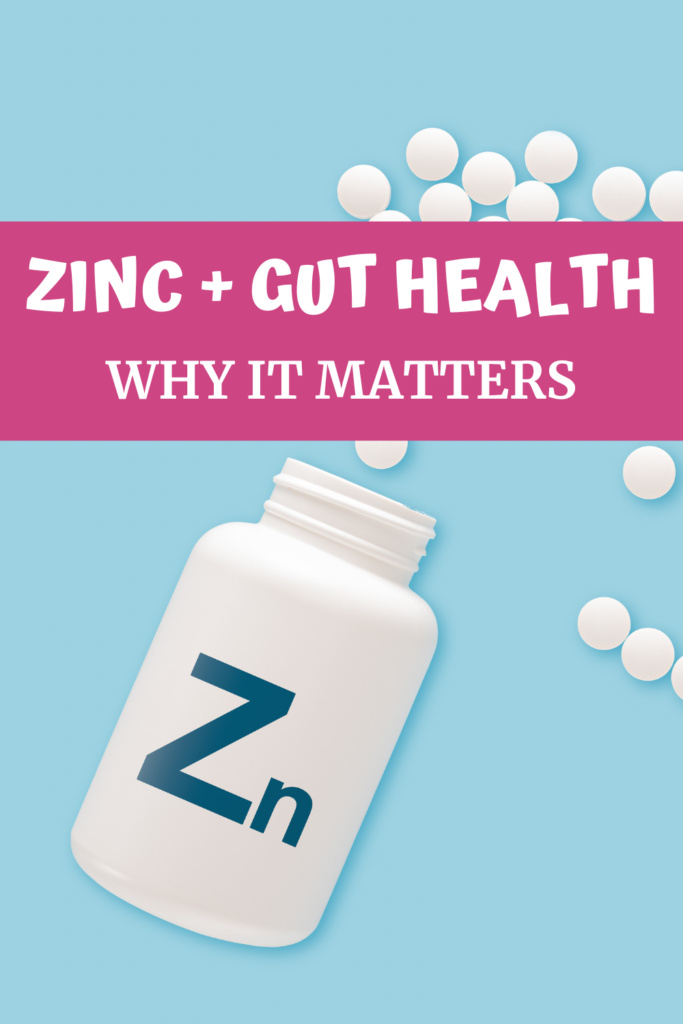
What is Zinc?
Zinc is known as an essential nutrient, meaning that the body can not produce it on its own.
The zinc levels in our body are based purely on the zinc we consume through either food sources or dietary supplementation.
Zinc has SO many functions across the human body including:
- aids in over 300 enzymatic reactions
- synthesis of immune cells
- support of immune function
- protein synthesis
- support of skin health
- HUGE player in cell growth
- supports both smell and taste
- maintenance of testosterone levels
- wound healing
- DNA synthesis- provides blueprint for all functions in the body
As you can see, zinc has a wide range of physiological processes across the digestive, immune, and metabolic systems.
It plays a crucial role in both the immune and digestive systems, which are important for keeping the gut in balance.
Source: HERE
Am I Getting Enough Zinc?
The RDA (recommended dietary allowance) of zinc varies based on age and gender.
It is advised that adult females should be eating about 8 mg of zinc each day while adult men should be eating 11 mg.
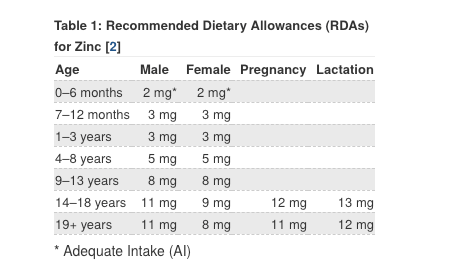
This may seem like it should be easy to reach, but your food may not contain as much zinc as you believe.
HERE is a list from the NIH of common zinc sources and their amount per serving.
As you can see, many of these foods “high” in zinc actually contain an average of 2 grams per serving (besides oysters, of course!).
This means that you may not be getting the zinc daily dose needed purely from food sources.
Other common sources of zinc include:
- shellfish
- animal meat
- fish
- legumes
- nuts
- dairy products
- eggs
- whole grains
- fortified breakfast cereals
Keep in mind that animal products fulfill zinc needs more efficiently.
Zinc coming from plant-based foods sources are absorbed less efficiently due to other interfering compounds in the plants.
To get high doses of zinc, I recommend choosing animal sources such as chicken, beef, and fish.
These are also high in vitamin B12, another common deficiency in the Gutsy community.
If you are vegan or against consuming animal products, supplementation may be a strong option for you to consider.
Source: HERE
Zinc Deficiency
If you are, in fact, low in zinc, here are some things you might be experiencing.
Signs and symptoms of low levels of zinc include:
- Age-related macular degeneration
- Diarrhea
- Hair loss
- Impaired vision
- Loss of taste or smell
- Poor appetite
- Depressed mood
- Decreased immunity; an impaired immune system
- Delayed wound healing
- Histamine intolerance
- Skin ulcers and acne
A zinc deficiency isn’t extremely common.
However, those with compromised guts are far more at risk than the average person due to absorption issues.
In fact, two groups of people who tend to have zinc deficiencies are those with a gastrointestinal tract disorder or those who have a strict plant-based diet.
Your Gut and Zinc
Save these zinc + gut health facts for later by clicking HERE.
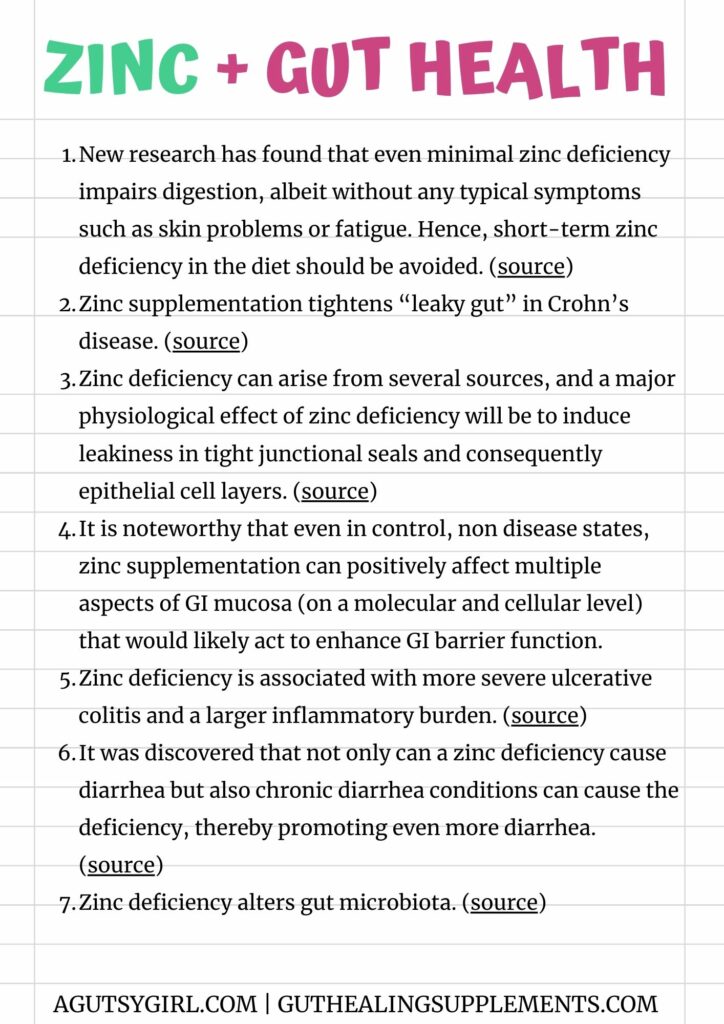
- New research has found that even minimal zinc deficiency impairs digestion, albeit without any typical symptoms such as skin problems or fatigue. Hence, short-term zinc deficiency in the diet should be avoided. (source)
- Zinc supplementation tightens “leaky gut” in Crohn’s disease. (source)
- Zinc deficiency can arise from several sources, and a major physiological effect of zinc deficiency will be to induce leakiness in tight junctional seals and consequently epithelial cell layers. (source)
- It is noteworthy that even in control, non disease states, zinc supplementation can positively affect multiple aspects of GI mucosa (on a molecular and cellular level) that would likely act to enhance GI barrier function.
- Zinc deficiency is associated with more severe ulcerative colitis and a larger inflammatory burden. (source)
- It was discovered that not only can a zinc deficiency cause diarrhea but also chronic diarrhea conditions can cause the deficiency, thereby promoting even more diarrhea. (source)
- Zinc deficiency alters gut microbiota. (source)
Zinc Plays an Important Role in a Healthy Gut
The main reason I wrote about zinc so often when writing The Leaky Gut Meal Plan is that we know the important role zinc plays for maintaining the integrity of the intestinal lining, thereby reducing the effects of leaky gut syndrome.
I’ve written an entire article about what leaky gut is (HERE), but in the simplest terms, Leaky Gut Syndrome is when the cells that make up the lining of the intestinal wall become so inflamed that the gut lining becomes more permeable than it’s meant to be.
Tight junctions should be kept as such so that food particles and other things don’t get through the bloodstream and vice-versa.
So when these junctions loosen, all sorts of problems start occurring throughout the digestive system.
Make note, though, that while the topic of leaky gut is starting to become more mainstream, many traditional doctors still don’t recognize it.
They do, however, recognize the term intestinal permeability. (BTW – these are things I teach in Gut Healing: ELEVATED – so that you can approach your gut healing journey in the best way with whatever medical providers you choose.)
Furthermore, zinc also helps repair and plays a key role in the intestinal cells (cells that line the digestive tract), keeping them strong so they can properly absorb nutrients.
Gut-Skin Connection
There is one more point I want to make regarding zinc and gut health.
You may recall from Skin Health and Endocrine Disruptors that one of the top 10 things you can do immediately from a food and lifestyle standpoint is, “Eat foods rich in zinc.”
And remember, if your gut is not well, many times, your skin is not well either.
Therefore, zinc is used internally for gut healing and health, but also internally (and even externally) for the skin.
Harvard states,
Zinc is used to treat inflamed skin conditions like burns, eczema, bedsores, and diaper rash. The compound forms a protective barrier on the skin’s surface, repelling away moisture and allowing the skin to heal. It may also aid enzymes to break down damaged collagen tissue so that new tissue can be formed.
The type of zinc matters, depending on what the acne is deriving from.
Healthline states,
One 2012 study reported that oral zinc was effective for inflammatory response and bacterial forms of acne. An earlier study found oral zinc was effective for people with mild acne, too. In either case, oral supplementation came with side effects like nausea and vomiting.
If acne is a major concern for you, I’d strongly recommend reading the full Healthline article HERE.
My Favorite Top 13 Foods Containing Zinc
So what do you do if you are, in fact, deficient in zinc and need to increase zinc intake?
Well, there are two main ways:
- Consume zinc-rich foods in your diet and
- Add dietary supplements
Here is a list of my favorite top 13 food sources containing zinc:
- Oysters
- Alaskan crab
- Hemp seeds
- Cashews
- Pumpkin seeds
- Grass-fed beef
- Chickpeas
- Lentils
- Black beans
- Chia seeds
- Raw oats
- 70%+ dark chocolate
- Guava leaves
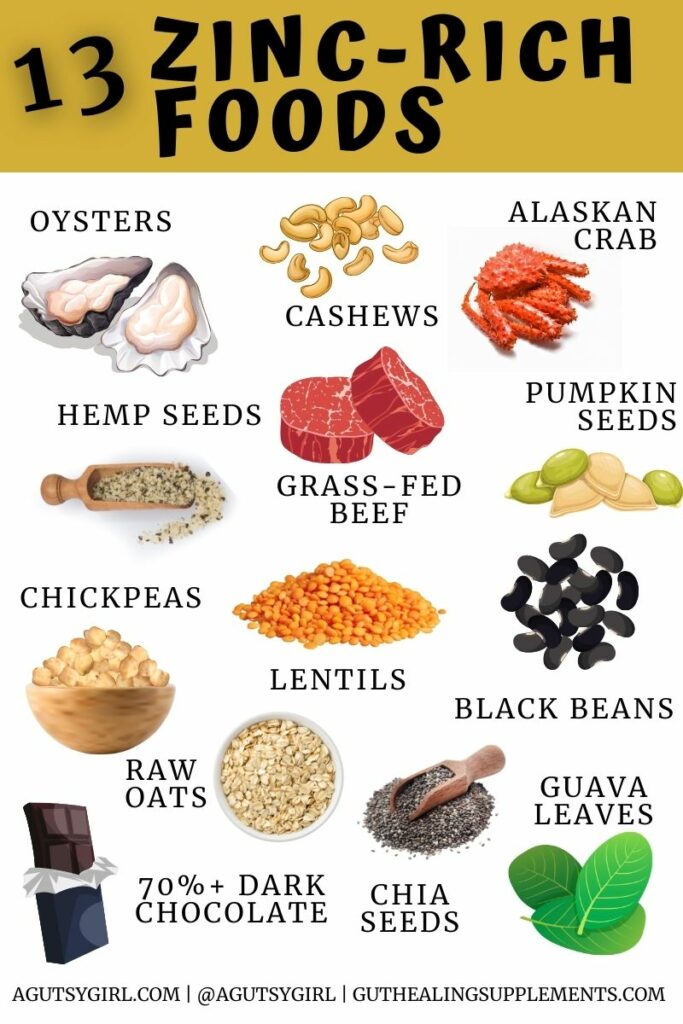
Note that with grains and legumes, zinc absorption is reduced due to high levels of phytic acid.
For this reason, yet again, meat and seafood are better choices.
However, I understand both the not-wanting-to-over-red meat and also the healing sides so I like to incorporate various sources.
Increasing food intake with zinc-rich foods might be all you need.
However, when food alone doesn’t prove to be enough for getting the zinc benefits the body needs, we typically turn to supplementation.
What to Look for in a Zinc Supplement
This is debatable.
On the one hand, one dietitian says,
Many types of zinc are available. Zinc sulfate is the least expensive form, but it is not as well absorbed as others and may cause stomach upset. More easily absorbed forms include zinc picolinate, zinc citrate, zinc acetate, and zinc glycinate.
According to the NIH, though,
There are various zinc supplements, for example, zinc gluconate, zinc picolinate, and zinc methionine. However, the differences in their cellular actions have not been elucidated to date. Such studies could distinguish between zinc supplements.
The other thing to make note of when it comes to zinc supplements is that many believe Zinc carnosine (which is different than just zinc) is the only way to go for healing the gut.
It has even been called, “The Magic Bullet.”
Zinc carnosine is a combination of of l-carnosine and zinc.
RD Doug Cook states, “Its unique structure is estimated to be three times more effective when it comes to healing than the individual ingredients it’s made up of; zinc and carnosine.”
Oral Zinc Supplements:
Some of the different types of zinc supplements include:
- zinc gluconate- fairly well absorbed and found in over-the-counter supplements and cold medicines
- zinc acetate- usually added to cold medications
- zinc sulfate- helps with both low zinc levels and targets acne
- zinc picolinate- one of the best absorbed forms of zinc
- zinc orotate- very widely available, bound to orotic acid, small molecules easily pass through gut membrane
- zinc citrate- appealing due to its slightly sweet taste, well absorbed by the gut
If you want a FULL breakdown of this essential mineral, check out the article I wrote: Zinc Bisglycinate vs Zinc Gluconate HERE.
In the article, I focus on chelated zinc bisglycinate via Nourish Plus, which I still think is superior for getting in this essential nutrient.
However, I also want to highlight another form of zinc I’ve run across and believe to be incredible: ZinCerola.
ZinCerola
What is ZinCerola?
This is simply: USDA Organic Vitamin C (from Acerola) and Zinc (from Guava Leaves).
The Guava leaves supply 11 mg of zinc (which is 100% daily value). And Acerola is an incredible food source of Vitamin C, which is an immune system booster.
And the combination hits on many different points this article has touched on.
Mother Nature gives us acerola cherries, which are rich in Vitamin C, and guava leaves that are a great source of Zinc.
In order for us to get 100% of the Daily Value of both Vitamin C (90mg) and Zinc (11mg) this supplement uses a 780mg blend of Organic Acerola and Organic Guava leaves.
Here is the uber-clean label:
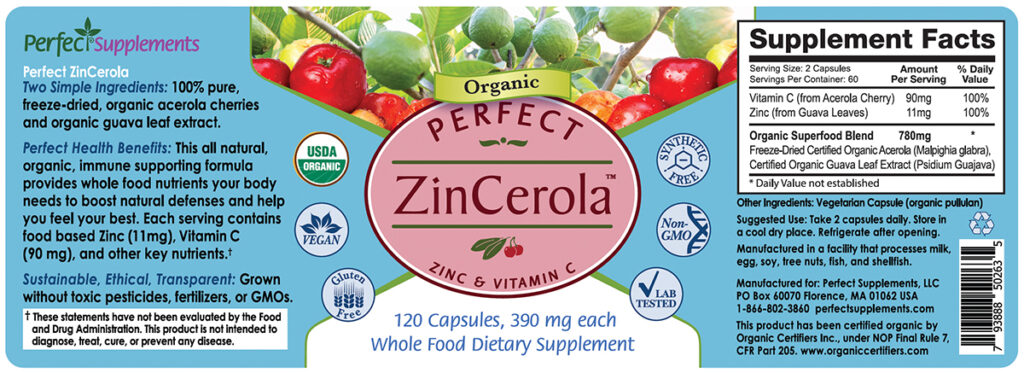
The Combination: Zinc + Vitamin C
Vitamin C and Zinc are well known for their ability to help boost your immune system.
There is no doubt that if you are feeling a little run down and under the weather, Vitamin C and Zinc are a powerful pair to get you feeling better soon.
But here are some things that Vitamin C and Zinc can help with, beyond the immune system:
- Provide A Powerful Antioxidant That Can Boost Your Bodies Natural Defenses*
- Helps Protect Cells from Damage Caused By Free Radicals*
- Helps Promote Blood Sugar Management*
- Helps the Body Make Collagen*
- Increases Absorption of Iron and Nutrients from Foods*
- Helps Shorten Wound Healing Times*
- Aides in Strengthening and Repairing Your Skin*
- Aides in Protein Production*
- Needed to Activate Over 300 Enzymes*
- Helps Fight Acne*
- Works to Maintain Strong Eye Health and Protect Against Vision Loss*
- Potential Protective Effect on Memory As We Age*
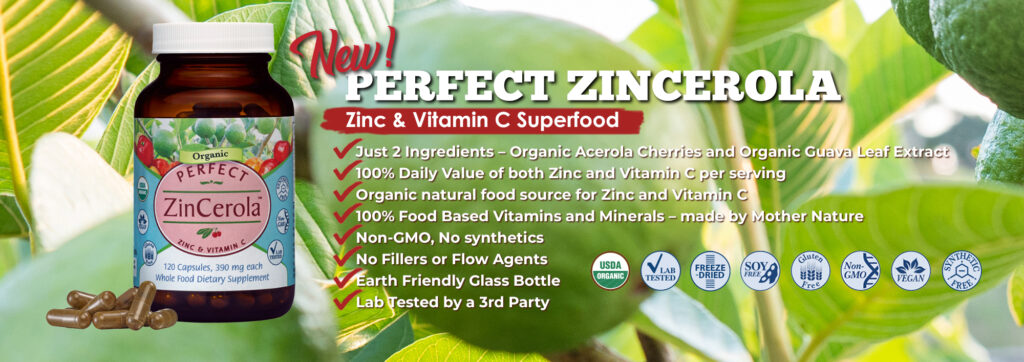
Additional zinc supplements for consideration
If you still want some more options, here are 2 I like and trust:
- Integrative Therapeutics – Zinc-Carnosine
- Thorne Research – Pic-Mins – Trace Mineral Complex with 7 Essential Trace Minerals
You can get both of these through my Fullscript Online Dispensary HERE.
Final Thoughts on Zinc and Gut Health
Note: If you’re using supplements to boost the amount of zinc in your body, be sure to do so with a medical practitioner.
Zinc can interact with some antibiotics and medications.
And again, zinc is a mineral that can easily be obtained from food.
It’s just that because you are Gutsy, with digestive health issues, it might not suffice.
Quick tip: If you’re going to supplement with zinc, consider really tracking it and then asking, “How is this working for me?” via our gut healing journaling SYSTEM.
You’ll track zinc (and all other supplements with the letter “S,” as indicated in your journal). Grab the journal PDF immediate download HERE or have us ship a printed copy by clicking HERE.
Sources: HERE, HERE, HERE, HERE, and HERE.
What are your thoughts on zinc? What has been your experience with it? I’d love to hear.
If you liked this post, you might also enjoy:
- Irritable Bowel Syndrome vs Inflammatory Bowel Disease
- Leaky Gut Supplements
- Does Zinc Help You Lose Weight
Xox,
SKH
🤰 bloating be gone! weight loss through optimal gut health for women
💃ʜᴇᴀʟ ʏᴏᴜʀ ɢᴜᴛ. ʜᴇᴀʟ ʏᴏᴜʀ ʟɪfe.
🫶🏻 founder gutbyome.com

